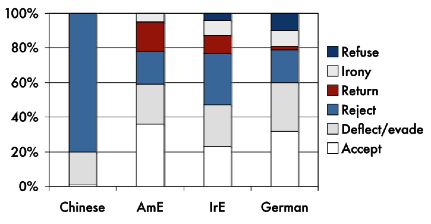Response – Laboratory – DCTs
In an influential paper, Chen (1993) contrasted how speakers of American English and speakers of Chinese respond to compliments. He collected his data with the help of a discourse completion test consisting of four different situations that cover the compliments on looks, clothes, achievements and possessions. Extracts (1) and (2) give a typical situation of the discourse completion test (Chen 1993: 70; also reproduced by Schneider & Schneider 2000: 80):
| (1) | You meet an acquaintance you haven’t seen for some time. After an exchange of greetings, s/he says: “You look so nice! Even nicer than when I saw you last”. To this, you reply: |
| (2) | You have given a presentation in your biology class. After the presentation, one of your classmates comes to you and says: “That was a great presentation. I really enjoyed it”. You reply: |
The questionnaire then provides four answer slots which the informants can fill with appropriate answers. The two language groups were represented by 50 students each. On the basis of his data, Chen concludes that for speakers of Chinese the modesty maxim (Leech 1983) is more important while for speakers of American English the maxim of agreement takes precedence.
Schneider and Schneider (2000) have replicated this study. They used the same discourse completion test and asked two more groups of 50 students in Dublin and in Hamburg to fill in the questionnaire. Thus they can compare compliment responses in four different cultures; Chinese, American English, Irish English and German. They can show considerable differences between the four groups of speakers. Figure 1 summarizes their results.

Figure 1: Compliment responses in Chinese, American English, Irish English and German (Based on Schneider & Schneider 2000: 74)
The differences between the American English, Irish English and German speakers are not very big, but the speakers of Chinese clearly behave very differently. Schneider and Schneider (2000) then merged the categories “refuse”, “reject” and “irony” into the superstrategy following the modesty or politeness maxim, while the categories “accept”, “return” and (with some hesitations) “deflect/evade” are merged into the superstrategy following the agreement maxim. On that basis the cultural difference become even clearer, as figure 2 shows.

Figure 2: Modesty versus agreement in compliment responses in speakers of American English, German, Irish English and Chinese (Based on Schneider & Schneider 2000: 75)
The differences between the four cultures are very significant. Speakers of American English opt for the modesty maxim in just about a quarter of all cases. In three quarters of the cases they opt for the agreement maxim. Speakers of Chinese opt for the reverse. Only twenty per cent opt for the agreement maxim, all others for modesty.
Lorenzo-Dus (2001) also carried out cross-cultural research on compliment responses with discourse completion tests. She compared British English and Peninsular Spanish university students. The analysis of the compliment responses was based on Herbert’s (1989) taxonomy (Response – Field – Diary). The set-up of the discourse situations took into consideration the power differential between the fictional complimenter and compliment recipient of the discourse completion test. There were an equal number of situations with the complimenter in the superior position, the recipient in the superior position, or with power symmetry between the two. The results revealed – among other things – that the British students were more likely than their Spanish counterparts to question the sincerity of the compliment; they were also more likely to respond with irony or humour to the compliments (Lorenzo-Dus 2001: 113).
Thus the method allows the collection and comparison of data across cultures. It is, of course, artificial to ask informants to write down what they would normally say. The data may be more stereotypical than the reality. However, it is also possible that the situations are not equally likely across the cultures. Speakers of American English might be much more forthcoming to pay each other a compliment because they can anticipate that it is not very difficult for the recipient to accept the compliment. The conflict between the modesty maxim and the agreement maxim is not experienced as a very serious one. For speakers of Chinese, on the other hand, this conflict might be much more serious, and, therefore, the speakers might hesitate to put each other in such an uncomfortable situation. It might be easier, and perhaps even politer, not to pay a compliment. The method of the discourse completion test ignores such difficulties and presents the situations to speakers of different cultures as if they were exactly the same.